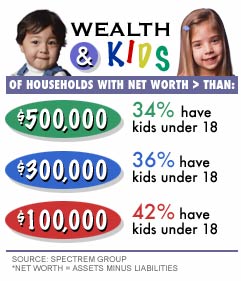
NEW YORK (CNN/Money) -
Ask financial planners what the best way is to get rich and they'll often say, "Don't have kids."
They're joking, of course. Children are the best kind of wealth around.
If, however, you're looking to build financial wealth while your kids are tugging on your purse strings for a good 21 years apiece...well, that can seem a little like being told to swim 100 laps doing the butterfly, and use only one arm for the last 50, please.
Still, even if you don't make a big six-figure income or aren't in line for a handsome inheritance, "you can have children and accumulate money," said certified financial planner Mari Adam.
That is, if you're willing.
Pick a goal and stick with it
Certified financial planner Jon Duncan's most financially successful clients with kids aren't necessarily the ones who earned the most. Rather, they were those whose "objectives were real clear from the beginning," he said.
Typically, they did two things early on: Regularly set aside money for college and regularly set aside money for retirement. They also bought their own homes and didn't take equity out through refinancing.
Adam has found much the same pattern and said for families making less than $100,000, "the only way they'll get ahead is the house and the 401(k)," given the tax advantages and the potential for appreciation in real estate and stocks.
A fitting lifestyle
Of course, funding a home, a college education and retirement cost serious money. But those who've been able to finance all of them without missing a school play or a mortgage payment "changed their lifestyle to accommodate that," Duncan said.

One client of his -- a banking manager with five kids who never made more than $85,000 a year in today's dollars as his family's sole breadwinner -- has a net worth of nearly $3 million after living in the same modest home for 30 years, staying out of debt, investing in his retirement plan and buying bank stocks whenever he could.
The banker also put all of his kids through college. But from grammar school through the state university, they took the public route all the way.
That's a key difference between wealth builders and others, Duncan and Adam said. If your income is not large and you're serious about building your nest egg, then your motto shouldn't be "Harvard, whatever it takes."
That's because your kids deserve a great education, but not necessarily the most expensive one. (That's not to say you can't get an Ivy League education at a discount, but in the event you don't qualify for one, there are high-quality alternatives to a Yale or a Brown.)
If your kids are set on a private college, then you might give them the amount it costs to go to your state's university and let them apply it to whichever school they choose, Adam said. Or you may let them pay for college on their own, especially if you've been paying for private school before college.
| RELATED ARTICLES
|

|
|
|
|
If your kids are young and you're considering private school, think about whether you really can afford it. (By "afford," don't just think about staying out of debt, but also being able to fund your retirement accounts.)
If you've got two kids, private school means two tuitions and double the annual "contributions" that private schools often expect students' families to make. Don't forget about the property taxes you'll pay to support those public schools your kids aren't attending, or the expense of your son or daughter socializing with classmates who have trust funds.
If your child is academically strong, a program for academic achievers in a public school might provide a very sound education and could save you $1,000 a month, said Adam, who just put one of her own kids in such a program.
Public-school alternatives such as magnet schools might be another option.
And if there really are no good public-school options where you live, you might consider a parochial school, which can be less expensive than a private school with no religious affiliation.
A lifestyle of choices
It's not just the big-ticket items that can make a difference between your becoming affluent or financially anorexic.
Adam has found that the wealth builders among her clientele "make choices all day long to live like a middle class person. Instead of picking the top-of-the-line category they're picking the middle-of-the-line...They don't buy what they can afford. They buy what they think is a good price-to-value exchange."
That means picking the Toyota over the Mercedes, the library over the bookstore, Target over Bloomingdale's, soccer over skiing, a local day camp over sleep-away camp. "People who control the little stuff master the big stuff," Adam said.
It also means banking and investing the extras -- the bonus, the raise, the inheritance -- if and when they come along. Not that you should never splurge. But among Duncan's and Adam's clients who have built their net worth, they chose not to nine times out of 10.
Of course, once you have teenagers, you can't always refuse the overpriced article of clothing that for reasons unknown to reasonable adults has become a "must have" among your kids' friends.
"You have to cave a little bit to pressure. You can't make them wear something gooney," Adam said. But at the same time, she added, you have to teach them that "I'm not defined by what's on my back."
While your kids deserve every advantage, are all their extracurriculars both after school and in summer really giving them the edge -- or could they derive just as much advantage doing one or two things less?
By cutting back, you might even teach them a valuable lesson that they'll take into their adult lives: They won't be able to afford everything they want.
"The way you get rich is moderation, moderation, moderation," Adam said. "You can't do everything. Make a choice."

|

